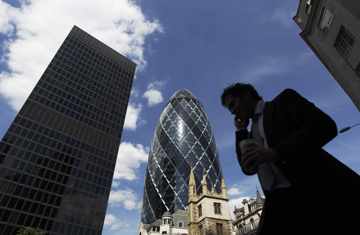
A man passes the Gherkin building, in the financial district City of London, June 22, 2010.
On June 22, Britain's Chancellor of the Exchequer George Osborne announced the U.K.'s emergency budget — a severe package of spending cuts and tax hikes meant to eliminate the government's £135 billion ($230 billion) deficit within four years. Critics expressed dismay that public sector workers will face job cuts and frozen wages, and deemed as savage planned reductions in public housing benefits and disability allowances. Yet there's one part of the budget that even Osborne's most emphatic critics have embraced: a levy on bank balance sheets.
"In putting in order the nation's finances, we must remember that this was a crisis that started in the banking sector," Osborne said as he unveiled the levy. "I believe it is fair and right that, in the future, banks should make a more appropriate contribution, which reflects the many risks they generate." The contribution takes the form of £2 billion ($3 billion) annually, raised on Britain's biggest banks — those with assets of more than £20 billion ($30 billion) and on foreign banks with U.K. holdings. When introduced in January 2011, the tax will be set at 0.04%, and rise to 0.07% though ministers won't spell out a timeframe and other technical details for several weeks.
For the banks at least, Osborne's blows seem to have landed lightly. Ahead of the budget announcement, market analysts feared that the levy could reach £5 billion ($7.4 billion) annually; after all, observers predict Britain's five largest banks will together earn nearly £28 billion ($41 billion) in 2011. But following the lower-than-expected charge, the state-owned Lloyds Banking Group (LBG) saw its share value rise 4.1%, and Royal Bank of Scotland (RBS) climbed 0.7%.
To ease fears that the levy will make London a less competitive financial center, Osborne emphasized that France and Germany have agreed to unveil similar measures. In a joint statement released on the same day as the U.K. budget, France and Germany said the design of their levies will vary as a result of domestic laws and tax structures, but that they will "take into consideration the need for a level playing field."
Of course, that field won't extend beyond Western Europe. Japan and Canada have already stated that they oppose such a tax, and legislation to introduce a levy in the U.S. remains stalled, suggesting banks could just move elsewhere. Fortunately for Osborne, there are other ways to squeeze money out of the reluctant institutions.
An alternate source of government revenue is tied up in the very risk that the government has been so keen to regulate against. In 2009, the U.K. Treasury set up the Asset Protection Scheme (APS) to guarantee the "toxic" assets of RBS, whose bad loans totalled a staggering £282 billion ($429 billion). Essentially an insurance policy against future losses, the APS covers 90% of all losses incurred after the first £60 billion ($89 billion). For their part, RBS, 84% of which is owned by the government, pays a premium of £700 million ($1 billion) per year for the first three years, and then £500 ($744 million) every year after that, until officials agree the bank can cope on its own. If a bank wants to withdraw from the scheme early, it has to pay: LBG, 41% of which is government-owned, forked over £2.5 billion ($3.7 billion) in cash to leave the scheme in late 2009. That means the APS generated £3.9 billion ($5.8 billion) in profit that year simply by insuring banks that it partially owns.
Of course, insurers play the odds and this is a frightening game. If the banks do incur potentially massive losses, the government will have to pay up. And that's tantamount to passing on the cost to the taxpayer, already smarting from the new budget, with a surplus of "tighten your belt" analogies and warnings from analysts that eurozone banks will incur another round of losses worth €200 billion ($244 billion) over this year and the next. No one really knows what the eventual liability for the APS could be. "It's a big black hole, potentially," says Tom Kirchmaier, an economist with the Financial Markets Group at the London School of Economics. "I don't think anybody has the full picture."
Naturally, those behind the scheme express cautious optimism. "Despite eurozone troubles, my central expectation remains that the taxpayer will make a £5 billion ($7.4 billion) lifetime profit out of the APS," says Stephan Wilcke, head of the Asset Protection Agency, which administers the scheme. "It's not yet clear sailing. But will the liabilities come home to roost? My prediction is that they probably won't." Surely that's one forecast that Osborne and the financial industry he is taxing are banking on.
